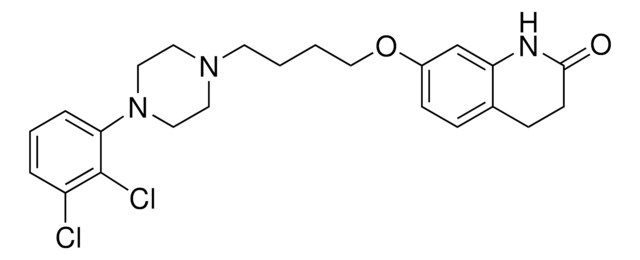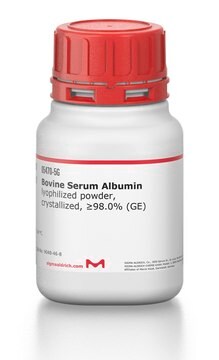A3059
Bovine Serum Albumin
heat shock fraction, protease free, essentially globulin free, pH 7, ≥98%
Synonym(s):
Albumin bovine serum, BSA, Bovine albumin
About This Item
Recommended Products
biological source
bovine
Quality Level
Assay
≥98%
form
lyophilized powder
mol wt
~66 kDa
purified by
heat shock fractionation
packaging
poly bottle of
origin
USA origin
technique(s)
ELISA: suitable
western blot: suitable
impurities
essentially globulin free
protease, none detected
loss
≤5%
pH
7
solubility
water: soluble (40 mg/ml)
UniProt accession no.
foreign activity
BT Virus, none detected
VSV Virus, none detected
storage temp.
2-8°C
Gene Information
bovine ... ALB(280717)
Looking for similar products? Visit Product Comparison Guide
General description
- Protein quantitation (as a standard)
- Immunochemistry (as a blocking agent)
- Cell culture (as a nutrient)
This particular BSA is specifically evaluated and tested to have very low protease content / for protease-free status. Protease-free BSA may be used in applications like:
- Enzyme assays
- Protein-based assays
- Protease-sensitive techniques that include:
b) Nucleic acid hybridization
c) Radioimmunoassay (RIA)
Application
Biochem/physiol Actions
Features and Benefits
- Heat shock fractionated
- Protease-free
- Essentially globulin-free
Preparation Note
also commonly purchased with this product
Storage Class Code
11 - Combustible Solids
WGK
WGK 1
Flash Point(F)
Not applicable
Flash Point(C)
Not applicable
Personal Protective Equipment
Certificates of Analysis (COA)
Search for Certificates of Analysis (COA) by entering the products Lot/Batch Number. Lot and Batch Numbers can be found on a product’s label following the words ‘Lot’ or ‘Batch’.
Already Own This Product?
Find documentation for the products that you have recently purchased in the Document Library.
Customers Also Viewed
Our team of scientists has experience in all areas of research including Life Science, Material Science, Chemical Synthesis, Chromatography, Analytical and many others.
Contact Technical Service



